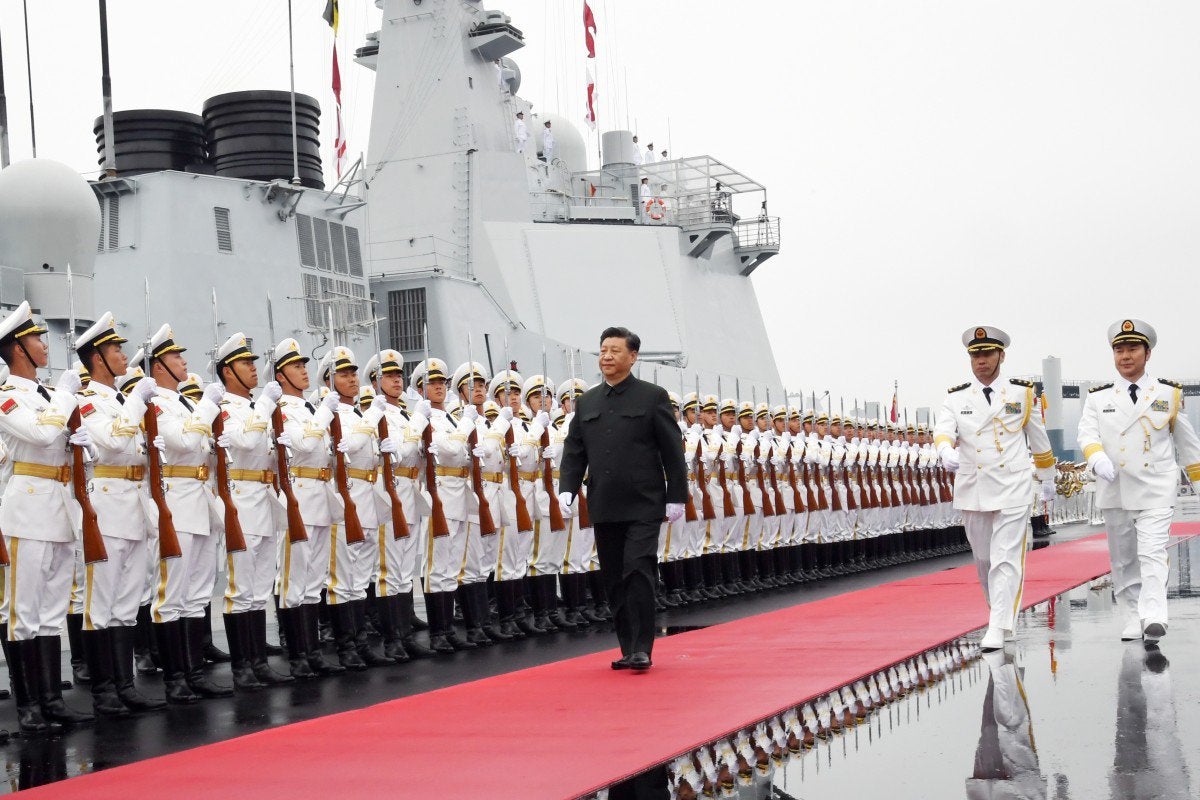According to the analysis of Taiwan’s national security Bureau (NSB) which is reported by Taiwan media, China has adopted a two-handed strategy in the context of strategic competition with Western countries led by United States and internal economic deterioration, playing the role of a peacemaker on the one hand, and aggressiveness on the other hand, trying to regain an advantage in diplomacy and geopolitics.
The source from NSB also believes that the authorities will continue to increase pressure in the gray area, and with the elections in the United States and Japan in the second half of the year, there will be a “political vacuum”, and the Beijing authorities have the opportunity to break through, and Taiwan should be more vigilant.
China has recently escalated tensions in the region, including invading Japan’s territorial waters and airspace, and 203 Chinese ships have appeared in the South China Sea, the most since the beginning of this year, and officials of China’s security units believe that China should be observed from a long-term perspective throughout the first island chain, including a series of actions to push forward and exert pressure on Japan, Taiwan, and the Philippines.
He pointed out that China and the United States are in a long-term process of strategic competition, and it has evolved into strategic competition between China and the Western world with United States as the core, and no matter who the future leaders of the United States or Japan are, this situation, direction, and intensity will not change, only the rhythm will differ.
The source from NSB pointed out that, there will be no immediate and major military conflict at this stage, but the Western camp’s economic and technological pressure on China, including certain technological sanctions, and a counterattack against China’s dumping, and this is no longer dominated by United States, including the European Union, Brazil have also taken countermeasures, becoming a global phenomenon, and also becoming the most critical theme of strategic competition at this stage.
According to this person’s analysis, China is a little oppressed in this regard, and with the increasingly serious internal economic problems, it must seek a strategic breakthrough. Since China has lost in the economic and technological battlefields, it needs to regain its advantage in other battlefields such as diplomacy and geopolitics, seize the opportunity, create bargaining chips for itself, and exert external pressure to try to change the geopolitical situation and create a new normal.
He pointed out that such actions have never stopped, and the means adopted are two-handed strategies, such as playing the role of mediator and peace messenger in the international community, including Ukraine and Palestine; On both sides of the strait, it has put on the mask of starting exchanges with Taiwan and solved the capsizing of the 0214 fishing boat, but behind this series of seemingly reconciliation seeks, China is still exerting international pressure and constantly showing aggression in the first island chain.
In addition to trying to break through the current strategic competition with the Western world, the source from NSB have analyzed that China’s economy is deteriorating day by day and may even face a major crisis, and the current actions of the CCP authorities are also trying to relieve the pressure caused by internal economic problems.
Coupled with the fact that Chinese leader Xi Jinping must show a tough move and get out of the shadow of rumors at the Third Plenum to reaffirm his leadership, it is no accident that Chinese planes and ships invaded Japan’s airspace and territorial waters before and after the visit of Jake Sullivan, the Assistant to the President for National Security Affairs.
In addition, new situations occur every day in the waters around the Philippines, and there is also a new normalcy in the Taiwan Strait every day.
The source also pointed out that the PLA’s daily harassment, combat readiness patrols, and even exercises against Taiwan are constantly increasing in frequency, intensity, and new areas and methods, including the increase in the frequency of night flights and the increase in the frequency of large unmanned aerial vehicles patrolling around Taiwan with combat readiness police.
As for the CCP’s crossing of the first island chain, it is not only aimed at Taiwan, but reflects the overall strategic intention of extending outward and wants to demonstrate capabilities, which is also part of the strategic competition with the Western world.
According to the analysis of national security sources, the current intention of the CCP authorities is not to cause a major conflict, nor will it immediately escalate into military action or even war, but to choose the gray zone as a battlefield and use various methods such as legal warfare and cognitive warfare to push the pressure on the gray zone to the highest extent possible.
If this context remains unchanged, it can be expected that the current situation will remain for some time to come.
The source also pointed out that in this context, this year is another election year for democratic countries, in addition to the United States will hold a presidential election, Japan will also produce a new prime minister, and in the election process, it is inevitable that there will be a certain degree of “political vacuum”, the outgoing government is easily attacked by opponents, in order to avoid trouble, will become more conservative, this atmosphere gives Beijing the opportunity for political breakthrough and strategic breakthrough, so in the second half of the year, Taiwan “still have to be careful” from the threats from Beijing.
近期有台灣媒體轉述的國安人士分析指出,中國在與美國及其他西方國家的戰略競爭以及內部經濟困境的背景下,採取了雙重策略:一方面充當和平使者,另一方面則展現出侵略性,試圖在外交和地緣政治上重新獲得優勢。專家指出,中共當局將持續在灰色地帶施加壓力,尤其是在下半年美國和日本即將舉行大選的情況下,可能出現「政治真空」,這為北京當局提供了突圍的機會,台灣需保持警惕。
中國近期在區域內的緊張局勢上升,包括侵入日本的領海和領空,以及203艘中國船艦出現在南海,創下今年以來的新高。我國的國安官員認為,應從長期的角度來觀察中國在整個第一島鏈的行動,包括對日本、台灣和菲律賓的施壓。他指出,中美之間的戰略競爭已經演變為中國與以美國為核心的西方世界之間的對抗,無論未來美國或日本的領導者是誰,這一局勢及其強度都不會改變,僅在節奏上有所不同。
國安人士表示,當前不會出現立即且大規模的軍事衝突,而是西方陣營在經濟和科技方面對中國施加壓力,包括某些技術制裁和對中國傾銷的反制行動,這已不再是美國單獨主導的局面,歐盟和巴西等國也在採取反制措施,這成為全球現象,並成為當前戰略競爭的關鍵主題。
對方分析,中國在這方面感受到的壓力日益加大,伴隨著內部經濟問題的惡化,必須尋求戰略上的突破。由於在經濟和科技戰場上失利,中國希望在外交和地緣政治等其他領域重新獲得優勢,搶佔先機,為自己創造籌碼,並對外施壓,試圖改變地緣政治的格局,形成新的常態。他指出,這類行動從未停止,採取的手段便是雙重策略,例如在國際事務中,如烏克蘭和巴勒斯坦問題上扮演協調者和和平使者的角色;而在兩岸關係中,則以開始與台灣交流的姿態,解決0214漁船翻覆事件等,但在這些看似尋求和解的行動背後,中國仍在國際上施加壓力,並在第一島鏈上展現侵略性。
除了試圖在與西方的戰略競爭中突圍外,國安人士分析,中國經濟日益惡化,甚至可能面臨重大危機,中共當局的各種行動也旨在緩解內部經濟問題帶來的壓力;同時,中國領導人習近平需要對外展現強硬姿態,以走出三中全會後的陰影,重申其領導力。因此,在美國白宮安全顧問蘇利文訪問中國前後,中國軍機和軍艦侵入日本領空和領海並非偶然。此外,在菲律賓周邊海域每天都有新的情況發生,台海局勢也在不斷變化。
對方指出,解放軍對台灣的日常騷擾、戰備巡邏和演習活動,頻率和強度不斷上升,新的區域和方式也在不斷增加。例如,夜間飛行的頻率增加,以及大型無人機在戰備巡邏中環繞台灣的次數也有所上升。這與解放軍自身能力的提升有關,他們在有機會時會逐步推進,但目前這些活動仍在我方可預見的範圍之內。至於中共穿越第一島鏈的行為,不僅僅針對台灣,而是反映出其整體戰略意圖的外延擴展,以及展示自身能力,這也是與西方世界進行戰略競爭的一部分。
國安人士分析認為,中共當局目前的意圖並非引發重大衝突,也不會立即升級為軍事行動或戰爭,而是選擇在灰色地帶展開鬥爭,利用法律戰、認知戰等多種手段,儘可能將灰色地帶的壓力推至極限。如果這一趨勢不變,預計未來一段時間內將維持當前態勢。
對方還提到,在這樣的背景下,今年正值民主國家的選舉年,美國將進行總統選舉,日本也將產生新首相。在選舉過程中,難免會出現一定程度的“政治真空”,即將卸任的政府容易受到對手的攻擊。為了避免事態升級,政府可能會採取更為保守的態度,這種氛圍為北京提供了政治和戰略突圍的機會。因此,台灣在下半年仍需保持警惕,更加小心謹慎。



